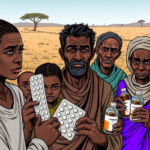Being an environmental migrant has different implications depending on gender. The experiences of men and women differ throughout the migration cycle, influenced by gender roles, norms, and responsibilities. Women, in particular, face unique challenges, such as needing male consent to migrate and being at higher risk of abuse and discrimination during their journey. Environmental migration is strongly linked to gender: women, often poorer and less educated, are disproportionately affected by climate change. In rural areas, the climate crisis increases women’s unpaid workload, reducing the time available for paid or educational activities. Integrating a gender perspective into migration management policies is essential for effective and sustainable responses. A gender-sensitive approach helps prevent the worsening of inequalities and develops long-lasting adaptation strategies. At Bambini nel Deserto, for over 20 years, we have supported the environment through the vital contribution of women, who are actively involved in our reforestation projects as part of the Green Re-Evolution program.
https://www.bnd.ngo/greenre-evolution/


